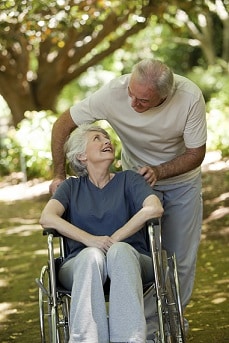
In 1992 the United Nations General Assembly proclaimed the 3rd of December as the International Day of Persons with Disabilities. On this occasion AGE draws attention to the actions needed to address the specific challenges faced by adults who live with impairments and functional limitations for the first time when they reach old age and by people who age with a pre-existing disability.
Older persons and the United Nations Convention on the Rights of Persons with Disabilities
The UN Convention on the Rights of Persons with Disabilities (CRPD) has defined disability in very broad terms. Under the CRPD, disability is not about having a specific medical condition or handicap, but rather “results from the interaction between persons with impairments and attitudinal and environmental barriers that hinder their full and effective participation in society on an equal basis with others.”
While not all older people are persons with disabilities, the likelihood of acquiring a disability increases with age. In the EU people at the age of 65 are expected to live more than half of their remaining years with a frailty or disability. Older people who require some support in their everyday living or encounter barriers in their participation due to mobility or cognitive constraints are covered by the provisions of this Convention.
Yet the increasing prevalence of disabilities as people age should not inhibit people’s autonomy and independent living. Too often, ageism reinforces images one may have of older persons as frail, dependent or merely subjects of welfare. These stereotypes, as recently recalled by Alana Officer from the World Health Organisation, clearly hinder the development of appropriate policy and societal answers to the challenges faced by older persons.
Further action needed to address the structural barriers faced by older persons with disabilities
Although the UN Convention on the Rights of Persons with Disabilities covers older people with support needs, its implementation has not paid sufficient attention to the situation of older people neither to the age-based biases that may lead to fewer services or choices as people get older. This was remembered by participants to the meeting that was organised in October together by the UN Special Rapporteur on the rights of persons with disabilities, Ms. Catalina Devandas-Aguilar and the Independent Expert on the enjoyment of all human rights by older persons, Ms. Rosa Kornfeld-Matte. In order to address the gaps in the protection of the rights of older persons with disabilities, enhanced attention to this group in the CRPD implementation and continuing exchanges between the two communities were seen as crucial.
AGE Platform Europe works closely with the European Disability Forum, the representative organisation of persons with disabilities at European level and we often coordinate our positions on key European dossiers. The proposal of a European Accessibility Act was a concrete occasion of several joint advocacy and awareness-raising actions towards the European Parliament, the European Commission and the wider public. In addition, AGE follows closely the implementation of the CRPD by the European Union and replies to several consultations of the Committee that monitors its application. Most recently, we submitted our views regarding the interpretation of article 5 of the CRPD on equality and non-discrimination, highlighting the intersectional discrimination based on disability and older age.
Respecting older people’s autonomy and independent living by adopting inclusive approaches
The human-rights based approach reverberates in all AGE activities. We thus aim to ensure the research and innovation projects of which AGE is partner of are underpinned by key ethical principles. Being an Advisory Board member of the ENNHRI project AGE contributed to the development of a human-rights based approach to long-term care. Countering ageist and disablist stereotypes requires to constantly call for accessibility and usability of all products and services, affordability of all these solutions, autonomy and empowerment of older persons, inclusion and non-discrimination as well as privacy, safety and security.
Ascribing to the motto of the disability movement, “nothing about us without us”, AGE asks for the continuous involvement of older persons in the design and development of solutions and environments that may impact their life. This approach was recalled by the Independent Expert on the rights of older persons who mentioned in a recent report that “specific efforts must be made to include marginalized groups and those not adequately covered in representative organizations of older persons, such as (…) those with complex support needs”.
The involvement of older persons and persons with disabilities is of utmost importance to ensure the solutions of tomorrow will answer their needs. In Prosperity4all, AGE worked along ONCE, the Spanish Foundation for the inclusion of persons with disabilities, and NCBI, the Irish national sight loss agency. All together, they contributed to developing a new ecosystem for accessible technologies that would best fit users’ needs. These grassroots collaborations and experimentations are essential to provide evidence and research findings that will then support improved public policies that promote human rights for both groups.






